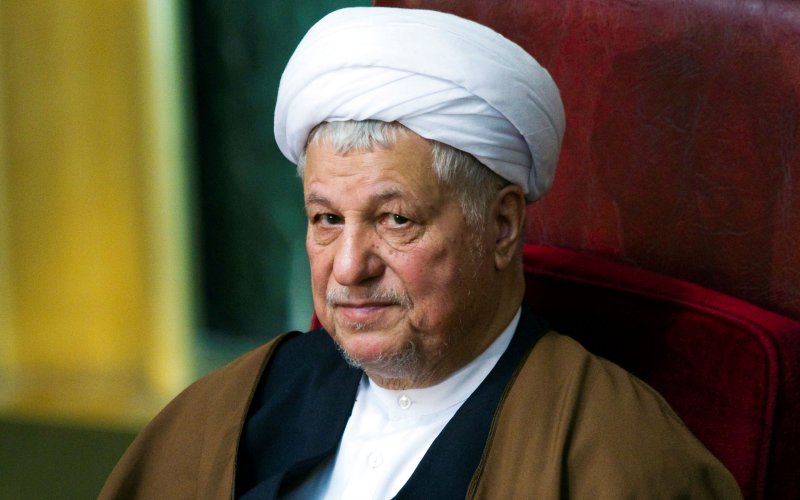How Akbar Hashemi Rafsanjani’s Death Will Empower The Ayatollah
Mon 09 Jan 2017, 09:02:51

The passing today of Akbar Hashemi Rafsanjani, president of Iran from 1989 to 1997 and a key figure from the 1979 Islamic Revolution, will have earthshattering consequences not only for Iranian reformists and moderates but also Iran’s immediate political future.
At the time of his death, Rafsanjani was president of the Expediency Council, an influential advisory body to the Supreme Leader. Reformist elements in the council have now lost a powerful protector. But this is the least of the inevitable impact of Rafsanjani’s passing.
For the past ten years, within the upper echelons of power, Rafsanjani was the main protective shield for Iranian reformists and other similar factions currently out of power. His fearlessness in confronting hardliners and even the Supreme Leader, Ayatollah Khamenei, with skillful use of the media to do so, created a balance in Iranian politics between moderates and hardline “principlists” largely loyal to Khamenei. The loss of Rafsanjani now causes an overwhelming vacuum that will upset the balance of power between hardliners and more moderate groups in the Islamic Republic.
President Hassan Rouhani’s reformist government will be the first to suffer from the fallout. With presidential elections later this year—just like the difficult days after the nuclear agreement was signed, which saw hardliners condemn the deal—Rouhani will need political support for his reelection. But with Rafsanjani gone, and no other reformist benefactor of his stature, Rouhani will be forced to fight hordes of hardliners and principlists on his own.
The death of Rafsanjani will also affect upcoming elections for Tehran’s City Council. Rafsanjani’s circle, and especially his son, Mohsen Hashemi, had high hopes for these elections. Mohsen Hashemi was looking to become the mayor of Tehran. But without the presence of the father, the fortunes of the Rafsanjani clan will now decline. They are not like Khomeini’s clan — who have remained preeminent in politics and religion by relying on his name and his stature. On the contrary, their days of hardship have just begun.
Dead Political Dreams
But beyond all this, Rafsanjani’s death is also the death of many reformists’ dreams; dreams like constitutional amendments to transform the supreme leadership into a council, rather than a one-man office, or increasing the supervisory powers of the Assembly of Experts over the Supreme Leader.
These dreams date back even to Khomeini’s time. But now it is too late for any of them to become real.
Rafsanjani was also the center of gravity for a group of politicians who not only helped reformists but had succeeded in convincing some principlists — such as Ali Akbar Nategh Nouri, Ali
Akbar Velayati and the Speaker of Parliament, Ali Larijani—to support Rouhani’s government. The chance of further alliances between reformists and principlists is much reduced.
Akbar Velayati and the Speaker of Parliament, Ali Larijani—to support Rouhani’s government. The chance of further alliances between reformists and principlists is much reduced.
Rafsanjani could not act as a political horse trader—for example, he could not prevent reformist candidates from being disqualified—but his role in guiding reformist politicians was a crucial one and, up to a point, he was able to influence Khamenei by preventing him from making one-sided decisions. Hardliners now have a chance to completely surround the Supreme Leader and block moderate influences. Rafsanjani played politics the way it was played during the time of Ayatollah Khomeini—or at least, that is what he wanted you to believe—but with his death the so-called “Imam’s Line,” key figures from the beginning of the Revolution, who were close to Khomeini—is near its end.
A New Political Landscape
Rafsanjani’s passing also ends a key source of opposition to many conservative hardliners in Iranian politics who are mostly associated Khamenei. They include former president Mahmoud Ahmadinejad, former head of the judiciary Mohammad Yazdi, the spiritual leader of Iranian hardliners Mohamamad Taghi Mesbah Yazdi and the Supreme Leader himself. It remains to be seen if anyone will be able to replace Rafsanjani as the main opponent of these prominent hardliners.
Despite all this, losing Rafsanjani is also an opportunity for Rouhani. The president can now come out from Rafsanjani’s shadow and seek to fill the void left by his death. Rafsanjani had high hopes for Rouhani and the president is still the most promising of Rafsanjani’s disciples in Iranian politics. But now Rouhani must pass the test of fighting for reelection against hardliners emboldened by the loss of his mentor. He has few other allies. Former reformist president Mohammad Khatami has been forced out of politics — it is illegal for Iranian media to even mention his name — and reformist leaders Mir Hossein Mousavi and Mehdi Karroubi are still under house arrest after the 2009 presidential election protests. It falls on Rouhani to become the new “godfather” of reformists and moderates.
This mission is even more challenging than winning the election or defending the nuclear agreement. Rouhani must not only protect Rafsanjani’s political legacy. He must also prevent the Rafsanjani coalition from falling apart — without it, no moderate will be able to influence public opinion or make new political deals. Rouhani’s first term has president has not shown any great success in this work. But perhaps that was because he was still under Rafsanjani’s shadow.
What is certain is this: with the death of Rafsanjani, Iran’s politics has entered a new era.
No Comments For This Post, Be first to write a Comment.
Most viewed from International
Most viewed from World
AIMIM News
Latest Urdu News
Most Viewed
May 26, 2020
Do you think Canada-India relations will improve under New PM Mark Carney?
Latest Videos View All
Like Us
Home
About Us
Advertise With Us
All Polls
Epaper Archives
Privacy Policy
Contact Us
Download Etemaad App
© 2025 Etemaad Daily News, All Rights Reserved.



.jpg)






.jpg)
.jpg)








.jpg)
.jpg)
.jpg)
.jpg)
.jpg)

















